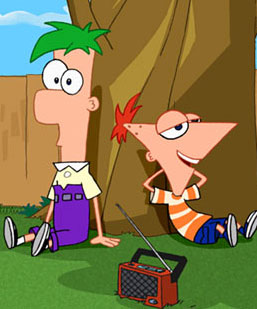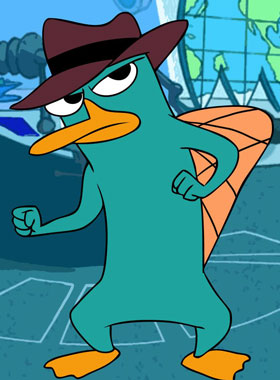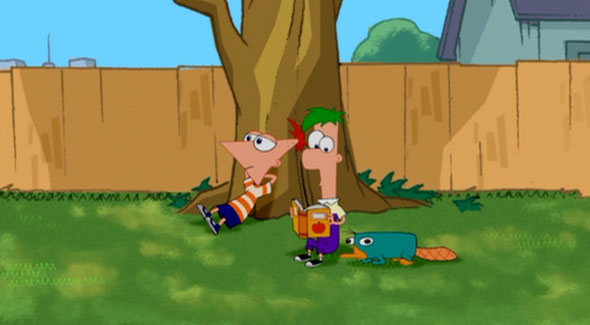 One of the pleasures of fatherhood is getting a second chance to enjoy Saturday morning cartoons. A good children’s show can be just as much fun for the grownups as it is for the tots. (If you don’t believe me, you need to YouTube up some Pee Wee’s Playhouse.) As recently as college, I was on a five-days-a-week Pokemon kick, and I remember loaning a DVD of Invader Zim to that cute girl in my Lit 210 class. (If she’s reading this, I want it back.)
One of the pleasures of fatherhood is getting a second chance to enjoy Saturday morning cartoons. A good children’s show can be just as much fun for the grownups as it is for the tots. (If you don’t believe me, you need to YouTube up some Pee Wee’s Playhouse.) As recently as college, I was on a five-days-a-week Pokemon kick, and I remember loaning a DVD of Invader Zim to that cute girl in my Lit 210 class. (If she’s reading this, I want it back.)
Recently, I’ve been rediscovering the joy of coming home from work, flopping onto the couch, and putting on a show where 80% of the ads are for breakfast cereal. We live in an age where television is reaching new heights of complexity and sophistication. But man can not live by Game of Thrones alone. Sometimes, you just want 15 minutes of cornball humor and slapstick. For that, let me recommend Phineas and Ferb.
P&F takes place over summer vacation, during which the titular step-brothers embark on an endless series of fantastic projects. They build a spaceship. They build a rollercoaster. They build some kind of soccer stadium that warps gravity so they can run up the walls. In classic cartoon fashion, the parents are never around to see any of this, which drives their older sister Candace crazy. Her mission in life is to “bust” them, proving once and for all that they really are building mind-boggling feats of backyard engineering. (“Mom!” she shouts at the end of the open credits, “Phineas and Ferb are making a title sequence!”) Interestingly, the boys never seem worried about Candace’s threats to bust them, and make no effort to hide their inventions from anyone. They don’t seem to comprehend that anyone would have a problem with their projects. “Aren’t you a little young to be doing this?” asks a construction worker delivering a flatbed of i-beams. “Yes,” says Phineas honestly. “Yes we are.”
(This isn’t the point of the article, but I have a theory about why Candace is so determined to bust the boys. Phineas and Ferb are step-brothers, a fact that’s made very clear by Ferb’s thick British accent. But clearly, they’re inseparable soulmates. They never want to spend the day playing with her. They’re always working on some invention that she doesn’t know the first thing about. I think Candace feels like Ferb stole her brother, and her step-dad stole her mother. The remarriage created two close family pairs, leaving Candace as the fifth wheel. Her attempts to undermine Phineas and Ferb are really attempts to open up a space for herself in the family, by prying those two apart. But on a less overthinky level, Candace is supposedly inspired by Jennifer Grey’s character from Ferris Bueller’s Day Off.)
 Okay, there are plenty of cartoons about kid inventors with limitless engineering skills and resources. Off the top of my head, there’s Dexter’s Laboratory, Codename: Kids Next Door, and Jimmy Neutron: Boy Genius. But what distinguishes P&F is that in every episode, there’s a secondary plotline involving the boys’ pet platypus, Perry. Unbeknowst to them, Perry is a secret agent who does daily battle against a mad scientist named Dr. Doofenshmirtz. Doofenshmirtz is always threatening to take over the tri-state area, with the aid of his something-inator. My favorite: the “If-A-Tree-Fell-In-The-Forest-Inator,” a ray gun which makes anything it hits fall over and whisper “Doofenshmirtz.” Perry is always temporarily captured, then escapes just in time. In the ensuing fight, the -inator of the day fires randomly, accidentally hitting whatever the boys have been working on. This usually results in it disappearing just before mom shows up. (Since you’re curious, the If-A-Tree-Fell-In-The-Forest-Inator knocks down a tree in front of a bus carrying a professional soccer team, which then detours to Phineas and Ferb’s house. The boys are playing in their gravity-bending soccer stadium, which they gladly give to the players as a gift.)
Okay, there are plenty of cartoons about kid inventors with limitless engineering skills and resources. Off the top of my head, there’s Dexter’s Laboratory, Codename: Kids Next Door, and Jimmy Neutron: Boy Genius. But what distinguishes P&F is that in every episode, there’s a secondary plotline involving the boys’ pet platypus, Perry. Unbeknowst to them, Perry is a secret agent who does daily battle against a mad scientist named Dr. Doofenshmirtz. Doofenshmirtz is always threatening to take over the tri-state area, with the aid of his something-inator. My favorite: the “If-A-Tree-Fell-In-The-Forest-Inator,” a ray gun which makes anything it hits fall over and whisper “Doofenshmirtz.” Perry is always temporarily captured, then escapes just in time. In the ensuing fight, the -inator of the day fires randomly, accidentally hitting whatever the boys have been working on. This usually results in it disappearing just before mom shows up. (Since you’re curious, the If-A-Tree-Fell-In-The-Forest-Inator knocks down a tree in front of a bus carrying a professional soccer team, which then detours to Phineas and Ferb’s house. The boys are playing in their gravity-bending soccer stadium, which they gladly give to the players as a gift.)
The important thing to remember is that the boys never learn that Perry is a secret agent, and they never learn that Doofenshmirtz even exists (except in the TV movie, which involves parallel universes and doesn’t count). In other words, just as Phineas and Ferb have a secret life their parents don’t know about, Perry has a secret life that the boys don’t know about. This reminds me of Fraggle Rock. There’s the crochety old human, whose poor dog is always trying to convince him Fraggles exist. Meanwhile, the Fraggles are constantly ducking the giant Gorgs (who consider them radish-stealing pests). And the Fraggles coexist with the Doozers, even smaller creatures who are always building intricate, mysterious structures. There’s a sense of multiple worlds revolving around each other, but never quite meeting.
Here’s an interesting detail about the Perry subplots: while the boys live in the suburbs, Doofenshmirtz has his headquarters on top of a big skyscraper. Perry actually has to commute to the city in order to fight him. This is very grownup of him, right? I almost feel like Perry is a stand-in for the boys’ parents, who are (by necessity) largely absent. I’m sure your average six-year-old feels like grownups either don’t understand or don’t care about their kid games, just as they don’t really understand the adult world. That’s what it’s like to be a kid: you’re convinced you know more than adults give you credit for, but at the same time you’re aware of how much you have yet to learn.
What makes Phineas and Ferb work is the boys’ kidlike myopia about the world around them. They focus on the game they’re playing, and miss the fact that the world’s greatest secret agent is literally living under their roof. It’s the opposite of, say, Inspector Gadget, in which the grownup is always missing the big picture and the kid has to save the world. There are a lot of cartoons which fulfill the kid fantasy of outsmarting the adults. But Phineas and Ferb never try to save the world; they let the world take care of itself, and focus on having fun. That’s a lesson kids and their parents can take to heart.

Pretty much in my top 10 of TV shows right now. And one of my favorite things about it is that despite the parents being clueless about what P&F are doing, they’re not stupid. They’re just never around when the crazy happens. They’re off doing adult things like going fishing or running their antique store. Although the Dad is more aware than Mom, but whenever he’s confronted with the crazy he generally asks Mom and she says she knows and is cool with it, because of the way he phrases his question. Also, it is filling with catchy little tunes, my favorite of them being The Evil Love Song. So much so that when I heard about the plot of the 2nd Dimension movie I had hoped that the reason that the parallel dimension Doofenshmirtz was successful at taking over the tri-state area was because the anti-love satellite never fired it’s ray at the evil girlfriend…
The idea of Perry as father-figure to Phineas and Ferb sorta reminds me of the Hardy Boys’ relationship with their father. In the books, Mr. Hardy was a real secret agent, who hovered around the edge of the boys’ cases and often descended as a deus ex machina to untangle the plot.
Also, I think you might be unnecessarily overthinking the psychology of Candace. Older kids have a pathological need to tattle on their younger siblings. I suspect it’s part of the search for autonomy, which sometimes includes exercising authority over someone else. Plus, the boys occasionally involve Candace in their schemes, and it’s hard to imagine her having much of a relationship with Jeremy without their interference/assistance.
It is explicitly stated in the movie that Candace is constantly trying to “bust” her brothers to keep them safe. They don’t pay attention to the world around them, and it causes her a great deal of anxiety. I’d say that it is her attempting to get her parents to spend more time with their children, doing normal, safe activities. When either she or one of her parents is involved in the scheme she spends significantly less time and energy trying to bust them. She wants a perceived normality that P&F regularly deny her via their genius.
This may be explicitly stated in the movie, but I’m going to go with the explanation posited here instead. Myself a family 5th wheel myself who is often subjected to the chaotic/neurotic genius of 2 brothers, I’d say that concern for the safety and best interest of a pair you are being actively excluded from is a flimsy veil for jealousy and loneliness (I have no latent childhood insecurities). While Candace wouldn’t necessarily know what to do with herself if suddenly included her brothers hijinx, it certainly wouldn’t hurt to be asked. It’s probably more similar to Ferris and Jeanie than we think- does he offer to help her skip school? Does he include her on his wild adventure? Who knows how long she has been harboring feeling of inadequacy? Jerk. (I also hate Ferris Bueller. It could really use some overthinking.)
I lost my train of thought. San Dimas High School Football Rules.
I’ve often wondered why more thinking has not gone in to this gem on a TV show. I thank you for this and look forward to hearing more from you on this subject.
@One: My thougts exactly.
@Leigh: “Unnecessarily overthinking” is always good overthinking IMO.
There seems to have this movement in children’s shows about catering to the older audience as well. You have Phineas and Ferb (P&F), as well as The Fairly OddParents (TFOP) and Spongebob Squarepants (SS), where an adult’s experiences and knowledge of pop culture history would reveal a deeper layer of wit and comedy. And so it’s interesting how they seem to deal separately with the concept of parenthood and the world-view, but come to the same conclusion.
As mentioned above, Phineas and Ferb have parents who are definitely smart, like their kids, but have little knowledge (counting out episodes of time travel, of course) of their everyday exploits because of unfortunate circumstances (I just love how the engineering marvels disappear right when the brothers are about to get caught). Compare this with The Fairly Odd Parents, where Mom and Dad seems to lack some form of knowledge and are unaware of the main thesis – that Timmy has fairy godparents. I posit that the state of the parents’ intellect are directly connected to the main thesis of the show: Timmy’s fantasy world vs. Phineas and Ferb’s scientific world, vis-a-vis Timmy’s dumb parents vs. Phineas and Ferb’s intelligent-yet-clueless parents. (Side note: I can even make the claim that Timmy’s world is dumber that P&F’s world (Francis vs. Buford, Tutti vs. Isabella, Vicky – which acts as Timmy’s older sister – vs. Candace, heck, probably even AJ vs. Baljeet). This is also reflected in the style of comedy: TFOP jokes use more physical comedy, while P&F jokes are more in the script and about understandng the circumstances. It’ll be interesting to do a study about children who are immersed in TFOP vs. P&F, and what their cognitive and social skills are in the future, which could shape TV programming going forward.)
Despite their differences, both protagonists have a secret world that the parents have no knowledge about, and the parents’ role is vital insofar that they must not know of the secret. Contrast both of them with Spongebob. His parents seem to be of the average type (vis-a-vis Patrick’s), and they have normal parental knowledge of his exploits (I say normal parental knowledge because I’m not sure how much they know about Spongebob’s exploits with Mermaidman and Barnacle Boy, for example). At the same time, however, they do not appear much in the shows, as they are easily overridden by other characters. In fact, they do not play much of a vital role in Spongebob’s main thesis – which is, I guess, being ready or something.
Thus, despite the differences of the three shows, they all say the same troubling thing: Your parents become all the more important to you if you have something to hide from them (on purpose – TFOP – or inadvertently – P&F). In fact, I will overreach a little and say that a bigger message that they’re saying is The world becomes all the more important to you if you have something to hide from it. I personally don’t think it’s a good message, but this world-view must be considered if we are to talk about the next generation, be it in social media, politics, or even the next generation’s economy.
(Note: Probably the difference in the focus on the parents also has something to do with factors such as age (Spongebob is depicted to be older than a kid, despite being childlike) and parent location (Spongebob lives alone). It only goes to show that shows like these have more to reveal to older people than pop culture references and adult jokes.)
I was introduced to Phineas and Ferb by a patient I took care of while I was in medical school. She was one of those precocious 7 year olds who loved to talk. And she loved Phineas and Ferb. I remember a slow afternoon when I went into her room to change her bandages, and instead ended up sitting by her bed and watching P&F with her while she told me about the planets (she was learning about space in school). It was one of the most memorable moments of my training and one that led me to ultimately choose pediatrics for a career.
In short: I am a pediatrician, and I approve of Phineas and Ferb.
My boss and I have boys about the same age. We joke about how great it is we get to watch shows like Phineas and Ferb thanks to the kids. I find myself telling people without kids to check it out as it is so clever. Great lines like “I am a woman of science or at least that is what my horoscope says,” keep you coming back for more.